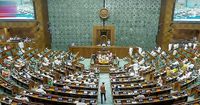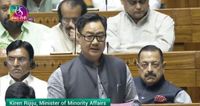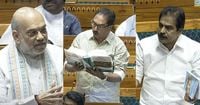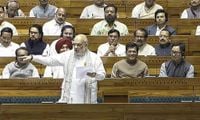The Waqf Bill, which faced significant opposition from the Muslim community, was passed in the Lok Sabha on Wednesday, April 2, 2025. The bill, which many believe infringes upon constitutional rights regarding religious freedom and the management of Waqf properties, was approved despite the concerns raised by various opposition members and protests across the country.
During the voting, 232 Members of Parliament (MPs) opposed the bill while 288 supported it, indicating a divided House. The voting procedure commenced at 12:06 AM on Thursday, April 3, and concluded at 1:45 PM the same day. The absence of Prime Minister Narendra Modi and Congress leader Priyanka Gandhi during this critical discussion and voting was notably remarked upon by several members.
Opposition members, including NK Premachandran, Gaurav Gogoi, and Asaduddin Owaisi, proposed numerous amendments to the bill, but these were overwhelmingly rejected. In total, at least 132 amendments were submitted by the opposition, while the government, represented by Union Minority Affairs Minister Kiren Rijiju, only introduced six amendments, most of which were technical in nature.
Speaker Om Birla faced a point of order raised by NK Premachandran, who argued that it was illegal to present the draft Waqf Bill, which had been submitted with the Joint Parliamentary Committee (JPC) report, as a new bill. However, Birla dismissed this point, allowing the government to proceed with the presentation.
Despite the opposition's united front, the ruling National Democratic Alliance (NDA) managed to secure support from its allies, including the Telugu Desam Party in Andhra Pradesh, the Janata Dal (United), and the Lok Janshakti Party in Bihar. This coalition support proved crucial in pushing the contentious bill through the House.
As the debate stretched over eight hours, the opposition raised serious questions regarding the government's claims about the bill. They challenged the ruling party's assertions concerning accountability issues related to Waqf and Waqf Board management, particularly regarding the Munambam land issue and women's representation. During the heated exchanges, Gaurav Gogoi, KC Venugopal, Akhilesh Yadav, Kalyan Banerjee, and A Raja voiced their concerns, leading to several statements being withdrawn from the House records.
In a dramatic moment during the debate, Asaduddin Owaisi tore up the bill in the House, symbolizing the fierce opposition it faced. The protests from Muslim organizations across India on the same day highlighted the widespread discontent with the bill, as they argued that it encroached upon their constitutional rights.
Amit Shah, the Union Home Minister, directed Rijiju to move forward with the bill's presentation, asserting that the government had the authority to introduce any bill approved by the Union Cabinet. This assertion of power has drawn criticism from opposition leaders who argue that the bill undermines secular principles and the freedom of religious practice.
The passage of the Waqf Bill has raised alarms among various community leaders who fear that it could lead to further marginalization of Muslim interests in India. The government's approach, they argue, appears to prioritize legislative expediency over the rights of religious minorities.
In summary, the Lok Sabha's approval of the Waqf Bill marks a contentious moment in Indian politics, reflecting deep divisions within Parliament and society at large. The ongoing protests and vocal opposition from various quarters indicate that this issue will likely continue to resonate in the public discourse as the implications of the bill unfold.







